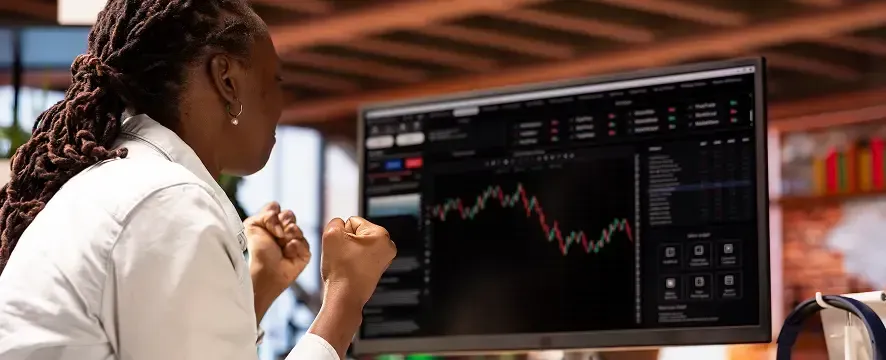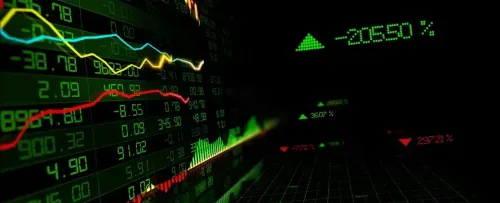
CFD Trading allows traders to speculate on a variety of underlying assets such as forex, commodities, indices, and crypto, offering the potential to make money from both rising and falling markets.
If you've heard about CFD trading, done your research, and decided you want to start trading, great! But now you're faced with another challenge: picking the right CFD trading account.
Between standard accounts, ECN accounts, pro accounts, and Islamic accounts, you're faced with many choices. But don't worry! In this article, we'll break it down and make it simple for you to understand, so keep reading.
Sure, your broker won't turn you from a bad trader into a good one. But it does shape important things like how much you pay, margin requirements and how fast your trades execute.
So, let's dive into the details.
Introduction to CFD Trading
CFD trading, or Contract For Difference trading, is a popular way for traders to speculate on the price movements of a wide variety of financial markets—without ever owning the underlying asset.
With CFDs, you can go long (buy) if you think the price will rise, or go short (sell) if you expect it to fall. This flexibility is one of the reasons why trade CFDs are so popular among traders looking to capitalize on both upward and downward price movements across rising and falling markets.
Another one of the main attractions of CFD trading is the ability to gain significant market exposure with limited capital, due to leverage.
With access to a diverse range of financial markets, CFD trading offers the flexibility to diversify your trading portfolio and even hedge your open investment positions.
For South African traders looking to tap into international CFD markets, CFDs provide a straightforward way to trade a diverse range of assets and respond quickly to price movements.
Why Your CFD Account Matters
Like elsewhere, CFD trading has really gained popularity in South Africa over the last few years.
But when it comes to CFD trading, the trading account you choose is not merely a formality; it determines how much you pay, access to leverage, fast execution and other important factors, so it's certainly something which warrants careful consideration.

The Different CFD Account Types
There are several different account types, each one with different characteristics.
Here are the main types of CFD accounts available:
Standard (Retail) Accounts: Where Most Journeys Begin
A standard retail account is basic, yes, but not in a bad way. For most South African traders, this is where it all starts. They typically offer low minimum account balance barriers and access to trade several asset classes, including the following:
- Forex
- Commodities
- Indices
- Crypto
Standard accounts are most commonly used by retail investor accounts, who should be aware that a significant percentage of retail investor accounts lose money when trading CFDs. It is important to fully understand the high risk of losing money rapidly when trading these complex instruments before trading.
Here's a key consideration when trading CFDs: Spreads.
When trading, you normally pay about 1.2 – 2.0 pips on major currency pairs. This may be okay if you're not trading too often, like swing trading. But if you make multiple trades a day, spread costs can really eat into your profits.
When you trade using a standard account, you're not actually trading directly with the global market; you're actually trading through your broker. Your broker is the one who sets the sell price, which is not necessarily wrong—just how CFDs work.
ECN Accounts: A Game-changer if You Trade Often
ECN stands for Electronic Communication Network, which allows you to trade directly on the underlying asset. The name might sound complicated, but what it really means is that you're trading directly with other people in the market. Think of it more like 'peer-to-peer trading'.
The big upside is much tighter spreads—sometimes less than 0.1 pip; however, you usually pay a small commission per trade, typically $7 per trade. This might sound like a lot at first, but it often ends up much cheaper overall—especially if you trade a lot.
ECN accounts typically provide access to an advanced deal ticket, allowing traders to customize order types and manage risk more effectively while dealing with market volatility.
Another upside to ECN accounts is that there's no dealing desk. If your strategy depends on speed and precision, ECN is a game-changer.
Professional Accounts: If You Know What You're Doing
Professional accounts certainly aren't for everyone. In fact, they are literally only available if you meet specific criteria based on your individual circumstances, like the following:
- Portfolio Size
- Trading Experience
- Specific Qualifications
But if you do qualify for this type of account, it offers some great benefits like these:
- High Leverage (Within SA's Limits)
- Lower Spreads
- Direct Access to Niche Instruments
- A Dedicated Account Manager
Professional accounts may also have higher maintenance margin requirements, which help ensure that traders can sustain their leveraged positions.
The downside is that there's less regulatory protection for traders, so you have more freedom and flexibility—but also less protection.
Islamic Accounts: Trading Without Compromising Faith
You may be wondering what faith has to do with trading? Well, for Muslim traders, swap fees pose a major problem. What are swap fees? They are fees you pay when you hold a CFD position overnight.
In order to get around this issue, Islamic CFD accounts don't charge any swap fees. Instead, they use a fixed-fee model, or just build the cost into the spreads. So, it's a way for Muslim traders to continue trading—without compromising their beliefs.
In terms of functionality, Islamic accounts are the same as standard accounts; it's just a matter of how the fees are handled. Islamic accounts may also provide access to ETF CFDs and share CFDs, which have their own unique fee structures and trading conditions.
Demo Accounts: The Best Place to Learn Without Consequences
Many traders don't fully utilize demo accounts as they were intended. They are the perfect way to actually put your strategy and theories to the test.
A demo account allows you to practice placing CFD trades and helps you understand how position size affects your potential profits and losses without losing money when trading.
It's easy to think you have found an edge. But it's another thing to actually prove it in the market. Demo accounts let you do this, without risking actual capital. It's basically a way to simulate real-life trading, without the financial risk.
Side note: Successful demo account trading does not guarantee you will be successful in live trading, as there is increased mental pressure. However, it is a great starting point.
CFD Trading Platforms and Tools
So, what are some of the main things you should be looking out for when choosing a trading platform?
Firstly, you'll want a platform that gives you access to real-time market data so you can make informed trading decisions across various financial instruments.
Secondly, you'll want sufficient technical indicators, advanced charting capabilities and drawing tools so you can plan out and execute your specific trading strategy.
If you're new to trading, demo accounts are super valuable to help you test and refine your trading strategy before you start trading with real money.
Also look for a broker that has a channel for support in case you need assistance during your trading journey.
Last, but certainly not least, make sure the broker is regulated and transparent about their margin requirements and trading costs.
Choosing Based on How You Actually Trade
This is an important consideration. Don't choose a pro account just because it sounds great. Match your account type to your actual trading behaviour.
The type of account you choose can affect how you open and manage a CFD position, including whether you take a long or short position and how you handle associated costs.
Here are some points for consideration:
Day traders:
If you trade often and quickly, spreads matter, so you'll want to consider an ECN account for better access to markets.
Swing traders:
If you hold your trades for days or weeks at a time, standard accounts will probably work just fine.
Swing traders benefit from the flexibility of CFDs, which can be traded over multiple days or weeks, allowing them to take advantage of price movements across different trading sessions.
Newbies:
If you're a new trader, stick with a demo account before slowly moving to a live account. It's important to take time to understand the differences between demo and live accounts before making the switch.
Funding, Fees, and Other Considerations
If you're a South African-based trader, how you actually move your funds in and out of your CFD account needs to be considered. SeacrestMarkets offers a pretty seamless experience, with local bank transfers clearing in 1-2 days, and credit card transfers clearing almost instantly.
Moreover, Seacrest Markets charges no withdrawal fees, which is quite rare, especially when dealing with international brokers.
Getting Started & Paperwork
To open a CFD trading account with Seacrest Markets (and most reputable CFD brokers), you'll generally need to provide documents to verify your identity and your address. This is part of the regulatory Know Your Customer (KYC) and Anti-Money Laundering (AML) procedures.
Here's a typical list of documents you may need to submit:
- Proof of Identity (POI)
- Proof of Address (POA)
- Additional Documents (Bank account details/source of funds/application form)
Final Thoughts: Picking the Right CFD Account
Here's the truth: No CFD account will magically turn you into a winning trader. But choosing the wrong account can definitely trip you up, drain your money, and make trading way more frustrating than it needs to be.
So, start where you are now and choose an account that matches your trading style—but can also grow with you.
There are tons of opportunities for South African traders in the CFD world—but plenty of people dive in without knowing the basics first. Remember that CFDs are complex instruments with a high risk, so it's important to understand why trade CFDs and how they work before committing your money.



